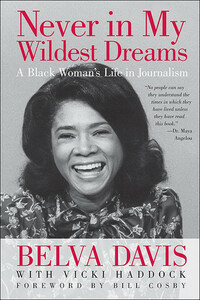Take a photo of a barcode or cover
3 reviews for:
Never in My Wildest Dreams: A Black Woman's Life in Journalism
Belva Davis, Vicki Haddock
3 reviews for:
Never in My Wildest Dreams: A Black Woman's Life in Journalism
Belva Davis, Vicki Haddock
What a compelling story of a fascinating life in journalism. I loved how Bay-Area-centric it was, and I just KNEW that if I waited long enough there would be an OPL reference in it. (There was: her best friend became the head librarian at MY branch! And put her librarian skills to use for Ms. Davis more than once!)
I don't think anybody will be teaching this one as an example of an elegantly-written memoir, but it was clear and interesting throughout. I really enjoyed reading it and have been widely recommending it!
I don't think anybody will be teaching this one as an example of an elegantly-written memoir, but it was clear and interesting throughout. I really enjoyed reading it and have been widely recommending it!
“Never in My Wildest Dreams” is an inspiring and insightful memoir of Belva Davis, the first black female news anchor on the West Coast.
Belva was born to a teenage mother in Monroe Louisiana during the Great Depression. During her childhood,she grew up feeling neglected and unloved by her family abs was often sent to live with various relatives to free up space in the small family home.
A threat of lynching due to a relative suing his workplace for suffering a job ending injury lead to Belva’s family moving from Louisiana to California. When Belva arrives in Oakland, California, she is excited yet anxious. It is during this time that as more blacks arrived in Oakland, this lead to a variety of jobs being created ion the railroad such as Pullman porters.
Belva’s excited of life is California is short lived when she arrives at her new home in the basement of a Victorian home which is owned by Portuguese family. Belva had a little small comfort when she was able to move in with her aunt and uncle in a nearby Alameda county. Unfortunately, Belva’s new move is short lived as she is sent back to Oakland when relatives arrive from Monroe with a baby. Though Belva is heartbroken by having to return to a crowded house in Oakland, she never gives up hope to someday have a room of her own and family to love her.
During Belva’s childhood in Oakland, she met a Rose Mary Prince, a girl who becomes a lifelong friend. As she befriends Rose Mary, she marvels at the touching relationship between her and her mother Miss Anna. Luckily, Belva is able to absorb extra love from Miss Anna and appreciates that Miss Anna provides her with motherly guidance lacking from her own mother.
As Belva gets older, she attends an integrated high school in 1948 and is soon adopted by a group of white girls. During her high school experience, she is treated as an equal to white students regarding her school work and joins the school’s bowling team. Belva has her first experience with racism when she attempts to go to a private bowling session at the local bowling alley. Although she bowls at the alley weekly with her high school team, she is turned away by an employee. When the bowling team sponsor sees Belva bowling with cans in her driveway and asks why she’s doing this, Belva shares her experience with racism. The bowling team sponsor comes to Belva’s aid, threatens to pull their business and soon, the bowling alley is all welcome to all students at all times.
In the spring of 1951, Belva becomes the first person in her immediate family to graduate from high school. Although Belva plans to go to college at San Francisco State University, due to a lack of funds and no family support, she shelves her dreams of higher education and instead becomes a typist at the Naval Supply store. As a way to escape her tumultuous home life, she gets married at age eighteen to Frank, the son of her next door neighbor.
Belva and Frank’s marriage begins with Frank leaving for training in Texas followed by a move to Washington, D.C. When Belva moves to Washington, she is in awe of working with so many black professionals. During this time, Belva gives birth to a son and eventually her and Frank clash on how to raise their son. After Frank’s discharge from the Air Force, they return to Oakland and both find jobs.
Since Belva’s new job was top secret, she offset her work life by joining several black women’s organizations. By joining these black women’s organizations, this helped her discover a lifelong love of sharing news with the black community as well as created connections that would lead to a successful career as a columnist, radio announcer and news anchor.
By the end of the book, Belva’s life has come full circle in that she has reconnected with her distant parents, had an illustrious career spanning decades and has accepted both sides of her: the confident overachiever as well as the self-doubter who constantly wonders if she deserves the accolades and awards she has received. Her story is one of overcoming challenges, perseverance, and fortitude in the face of sexism and racism.
Belva was born to a teenage mother in Monroe Louisiana during the Great Depression. During her childhood,she grew up feeling neglected and unloved by her family abs was often sent to live with various relatives to free up space in the small family home.
A threat of lynching due to a relative suing his workplace for suffering a job ending injury lead to Belva’s family moving from Louisiana to California. When Belva arrives in Oakland, California, she is excited yet anxious. It is during this time that as more blacks arrived in Oakland, this lead to a variety of jobs being created ion the railroad such as Pullman porters.
Belva’s excited of life is California is short lived when she arrives at her new home in the basement of a Victorian home which is owned by Portuguese family. Belva had a little small comfort when she was able to move in with her aunt and uncle in a nearby Alameda county. Unfortunately, Belva’s new move is short lived as she is sent back to Oakland when relatives arrive from Monroe with a baby. Though Belva is heartbroken by having to return to a crowded house in Oakland, she never gives up hope to someday have a room of her own and family to love her.
During Belva’s childhood in Oakland, she met a Rose Mary Prince, a girl who becomes a lifelong friend. As she befriends Rose Mary, she marvels at the touching relationship between her and her mother Miss Anna. Luckily, Belva is able to absorb extra love from Miss Anna and appreciates that Miss Anna provides her with motherly guidance lacking from her own mother.
As Belva gets older, she attends an integrated high school in 1948 and is soon adopted by a group of white girls. During her high school experience, she is treated as an equal to white students regarding her school work and joins the school’s bowling team. Belva has her first experience with racism when she attempts to go to a private bowling session at the local bowling alley. Although she bowls at the alley weekly with her high school team, she is turned away by an employee. When the bowling team sponsor sees Belva bowling with cans in her driveway and asks why she’s doing this, Belva shares her experience with racism. The bowling team sponsor comes to Belva’s aid, threatens to pull their business and soon, the bowling alley is all welcome to all students at all times.
In the spring of 1951, Belva becomes the first person in her immediate family to graduate from high school. Although Belva plans to go to college at San Francisco State University, due to a lack of funds and no family support, she shelves her dreams of higher education and instead becomes a typist at the Naval Supply store. As a way to escape her tumultuous home life, she gets married at age eighteen to Frank, the son of her next door neighbor.
Belva and Frank’s marriage begins with Frank leaving for training in Texas followed by a move to Washington, D.C. When Belva moves to Washington, she is in awe of working with so many black professionals. During this time, Belva gives birth to a son and eventually her and Frank clash on how to raise their son. After Frank’s discharge from the Air Force, they return to Oakland and both find jobs.
Since Belva’s new job was top secret, she offset her work life by joining several black women’s organizations. By joining these black women’s organizations, this helped her discover a lifelong love of sharing news with the black community as well as created connections that would lead to a successful career as a columnist, radio announcer and news anchor.
By the end of the book, Belva’s life has come full circle in that she has reconnected with her distant parents, had an illustrious career spanning decades and has accepted both sides of her: the confident overachiever as well as the self-doubter who constantly wonders if she deserves the accolades and awards she has received. Her story is one of overcoming challenges, perseverance, and fortitude in the face of sexism and racism.


